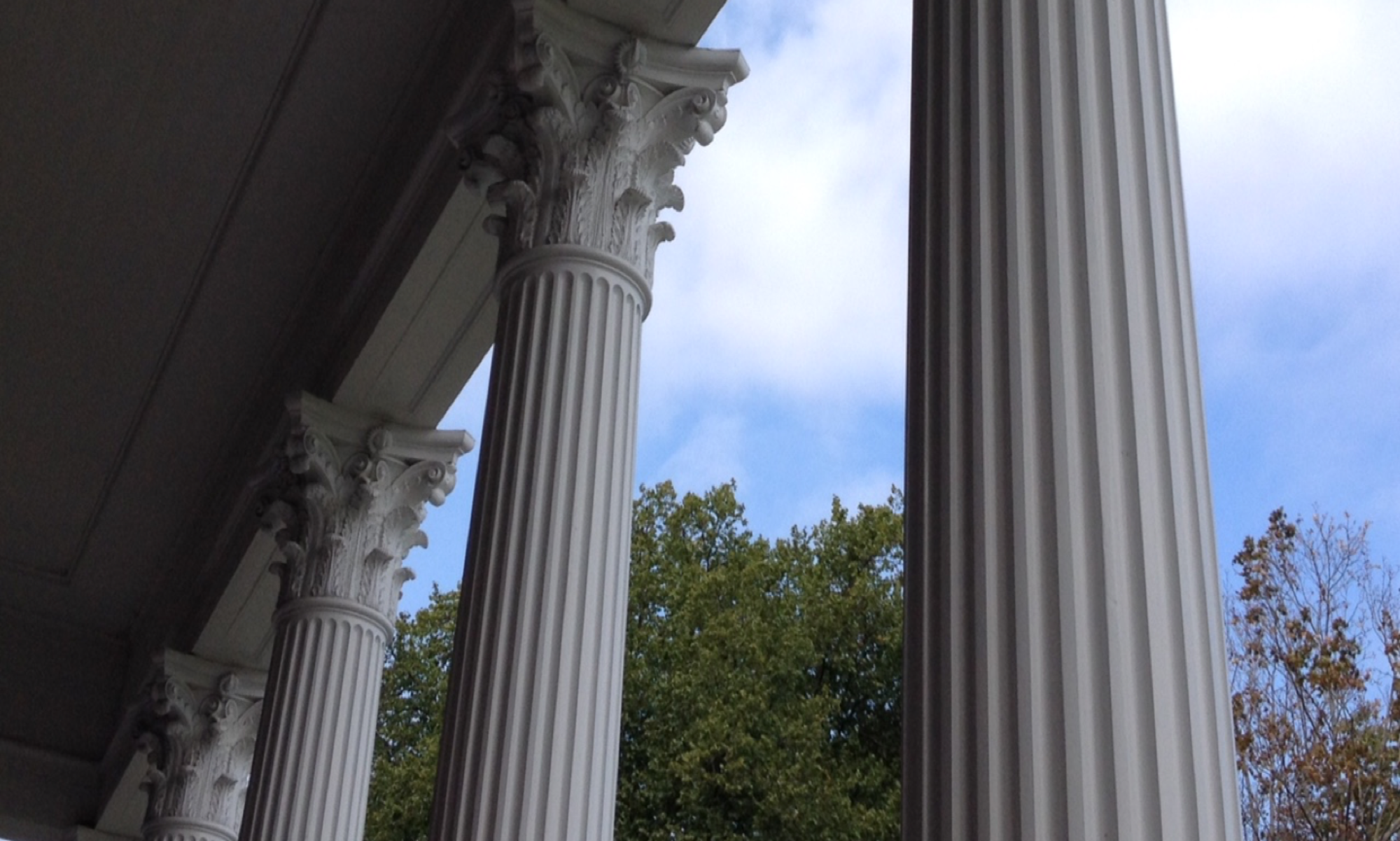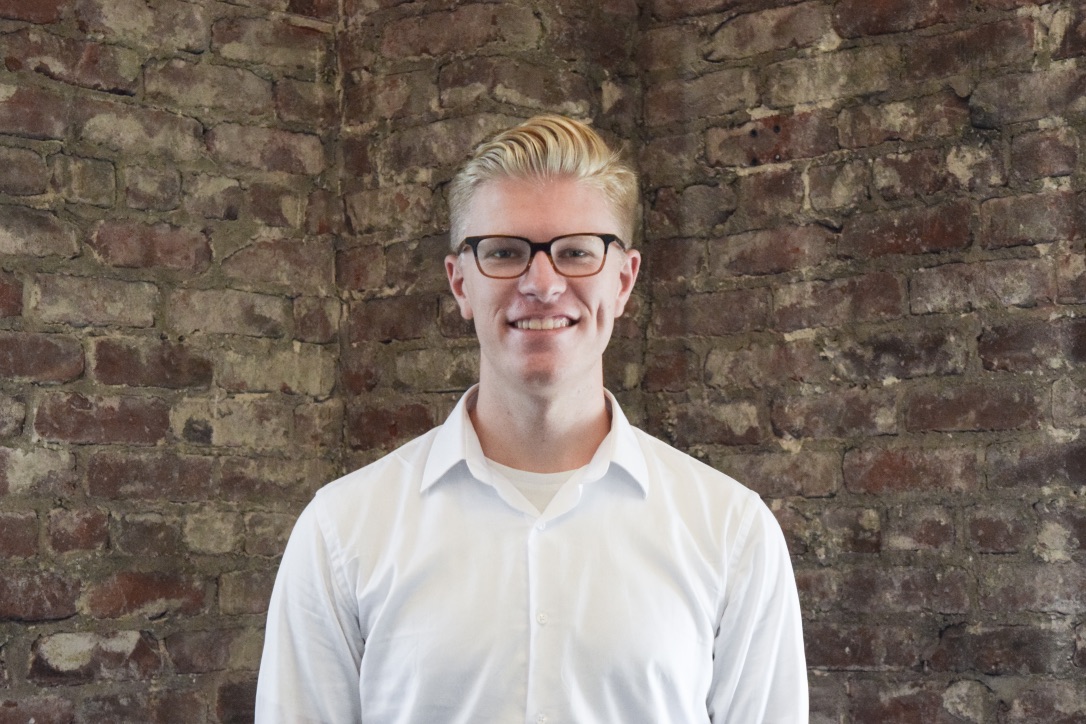On October 6, 2020, Dr. Anthony Fauci ’62, the director of the National Institute of Allergy and Infectious Diseases and a Classics major while at Holy Cross, spoke with current students about the COVID-19 pandemic, the benefits of his liberal arts education at Holy Cross, and much more. See the recording of the conversation below.
Classics alum Anthony Fauci ’62 discuses the COVID-19 pandemic & his time at HC with current students
Alum blog post: From Latin, Greek, and Manuscripts to Engineering Software
Alex Simrell ’16 lives in the San Francisco Bay Area and works as a software engineer for Grokker. While a student at Holy Cross, Alex spent a semester abroad in Athens, and served in his senior year as the president of the Manuscripts, Inscriptions, and Documents Club.
Classics majors are often asked, “Why are you studying a dead language?”, “What will you do with that?”, or something along those lines. For me the answer was simple: I wanted to be a Classics teacher.
I delayed entering the teaching profession and accepted a Fulbright research grant to work on the CroALa project, a digital collection of Croatian Neo-Latin texts. In Croatia I became fascinated with the technical side of my research, and afterwards completed an intensive three-month “programming bootcamp.”
Now three years into my career as a Software Engineer, I have a new appreciation for my Classics background. Computer languages are more similar to Greek and Latin than you might think. When learning to code, the focus is primarily on reading and writing. First you need to learn the vocabulary and rules of the language. Then you use that knowledge to construct sentences or lines of code to state an idea. Finally you put those ideas together to express something more complicated. You need to balance understanding the big picture with paying attention to the smallest details (computers are not very forgiving)!
The skills I developed as a member of the Manuscripts, Inscriptions, and Documents club have been especially applicable. Although I did learn technical skills that are very useful, the non-technical skills have been even more helpful so far. Many people imagine programmers writing code alone in a dark room, but in reality code is written by teams. Strong communication is crucial. Presenting my MID research to Classics people without a technical background and technical people without a Classics background prepared me well for communicating with other software engineers as well as non-technical business people.
I believe that the point of a Classics education is not to learn specific content knowledge, but to build a foundation for future learning. My Classics background provided me with a strong foundation for Software Engineering, and I’m so grateful for the opportunities it has given me.
Alum Blog Post: Studying the Classics as Pathway to Understanding and Liberation
Meredith Coolidge ’19 is teaching English and tutoring Latin at the Young Men’s Leadership Academy at Wheatley in San Antonio, TX, through the Teach for America program. At Holy Cross Meredith was a double-major in Classics and Political Science, and in 2018-19 she served as Student Government Association Co-President.
The classics major at Holy Cross is distinct because of its Jesuit affiliation. I was fortunate to take classes with professors and on course material that encouraged me to unlearn or see differently many of the ways the classics has been applied throughout history. By the end of my college career, I found myself reading the classics from a new perspective, namely, “How does this inform how I am becoming a person for and with others?”
Through Teach for America, I was placed in San Antonio, TX as a high school teacher at a Title 1, all-boys, public charter academy. Our school is located on a historically-black campus named for famous classicist and poet Phillis Wheatley.
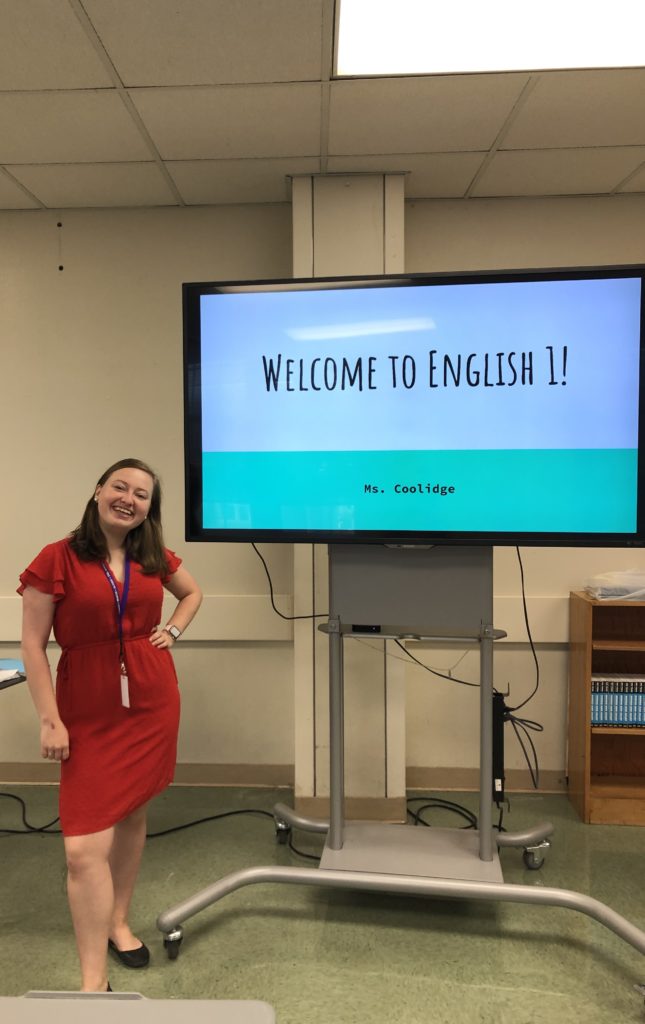
Studying Latin is especially useful for my English Language Learners. I acquired an ESL certification because most of my students speak Spanish, and Latin has been a helpful way to contextualize commonalities between the Spanish and English languages. It also helps my students, most of whom will be the first in their families to graduate from high school, stand out with rigorous course loads as they consider applying to colleges like Holy Cross. I don’t know if there is anything more substantial to set up students for the rigor of a college education than requiring Latin beginning in middle school.
As an English teacher/Latin tutor, I try to find ways to make Latin “cool” and “relatable” (and not just because my kids perhaps ironically call me Ms. Cool). We’ve played word games with Latin prefixes, read mythology, and applied Latin syntactical principles to better understand the functions of English words, which has already improved my kids’ writing and reading comprehension. Explicitly teaching a critical subject (a core, state-tested one) but having a Classics background has helped normalize taking Latin for my students and colleagues.
I did not anticipate my Teach for America experience to be so profoundly influenced by my undergrad major, partially because before I left Holy Cross, I didn’t always see the link with liberation that I see now. I’ve realized my favorite classics courses at Holy Cross were ones in which I saw strong female characters or read texts I could relate to; I am hopeful that by framing characters in classical texts as liberators, my students can see themselves in the Ancient World. The themes in classical texts can be mostly universally applied to contemporary human experiences. It might be a stretch, but focusing on such commonalities in our shared human experience could help heal our increasingly polarized modern world.
Classics & Chemistry major Chris Puntasecca ’19 to attend Stanford Medical School as a Knight-Hennessey Scholar
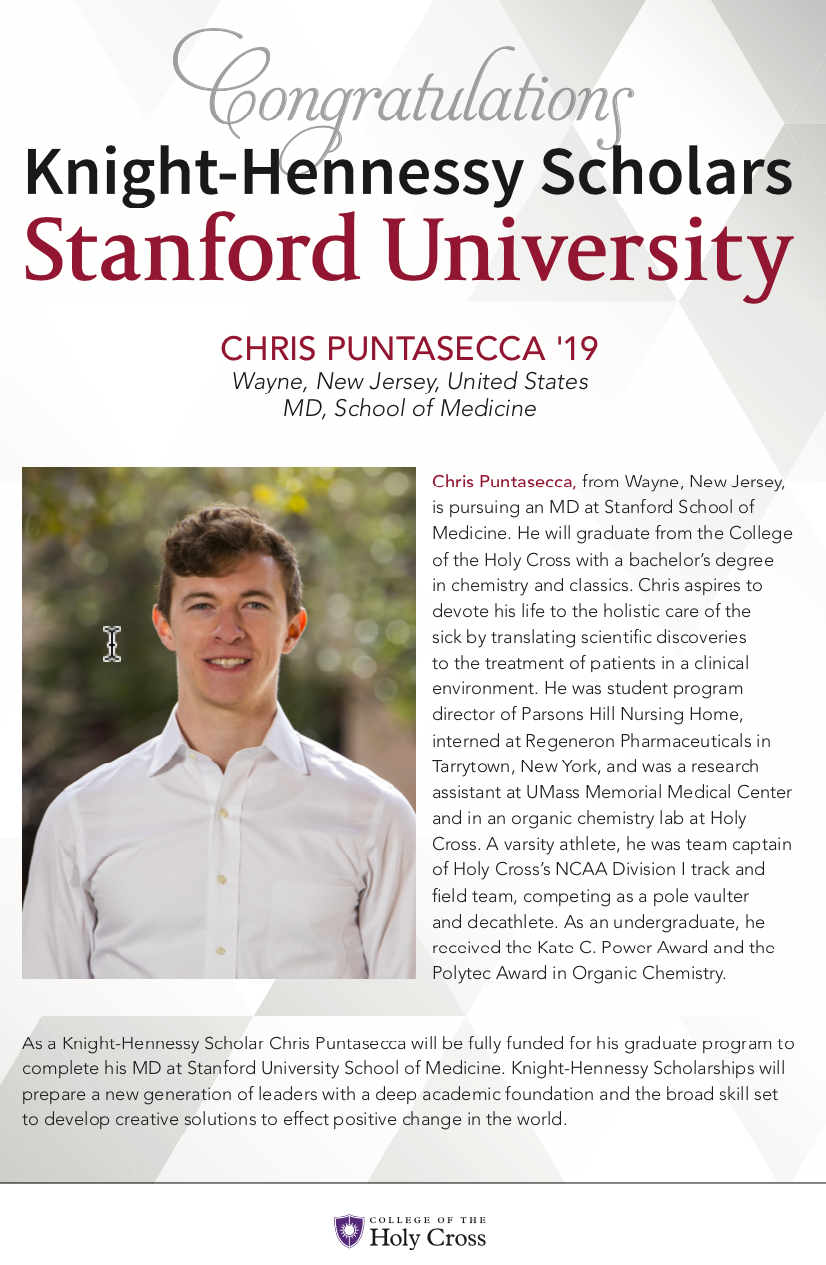
In case you missed it: links about HC Classics from earlier this year
*CBS news aired a feature story on departmental alum Anthony Fauci ’62 and his work on the AIDS epidemic
*Departmental alum Tabitha Lord ’93 published her second novel, titled Infinity.
*The Holy Cross website included profiles of retiring faculty, including Prof. Blaise Nagy of the Department of Classics.
*Jason Steranko ’17 blogged over the summer about his collection of Ancient Greek black-out poetry, titled Melasmos.
*The article “Citation and Alignment: Scholarship Outside & Inside the Codex” in the journal Manuscript Studies, written by Christine Roughan ’14, Prof. Neel Smith, and Christopher Blackwell, was made available through open access.
*Prof. Mary Ebbott’s essay “Seeking Odysseus’ Sister” appeared in Michigan Quarterly.
*Plans for the College’s new Center for Arts and Creativity will include a studio theater named after the late Kenneth Happe ’58, an associate professor emeritus of Classics.
Maureen Lamb ’07 named Connecticut Language Teacher of the Year
We extend congratulations to Maureen (Gassert) Lamb ’07, who was named the 2016–17 Connecticut Language Teacher of the Year. Maureen has been teaching Latin at the Westminster School in Simsbury, CT, for eight years and is currently serving as the Language Department Head. While at Holy Cross Maureen was a double major in Classics and Music.
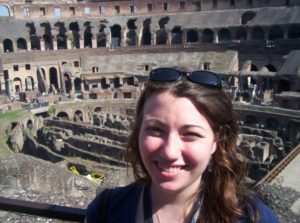
Maureen was also recently awarded the 2017 Dr. Elizabeth Watkins Award from the American Classical League, as well as a Mead Fellowship from the New England Council of Foreign Language Teachers to create a website with resources for beginning Latin and Ancient Greek teachers in New England.
For more on Maureen’s honor as Connecticut Language Teacher of the Year, click here for the story in the Hartford Courant.
Alex Simrell ’16 blogs from the University of Zagreb in Croatia
Alex Simrell ’16 is spending 2016-17 at the University of Zagreb in Croatia on a Fulbright Fellowship. Click here for Alex’s blog, which includes an entry that makes the case for the long-term importance of studying Greek and Latin.
ICYMI: Holy Cross Classics links from Summer 2016
Click on the hyperlinks in bold to proceed to the pieces:
*In May Gabe Weaver ’04 was named the first-ever Herman M. Dieckamp Post-Doctoral Fellow by the Information Trust Institute (ITI) at the University of Illinois.
*In June the new crime novel Brighton by Michael Harvey ’84 was published by HarperCollins.
*In June Kevin Spinale ’00 was ordained into the Society of Jesus.
*Luis Perez ’17 reflected on his experience in the Maymester program “Rome in History and Imagination.”
*Daniel Cavoli ’80, Latin teacher at St. Edward’s High School in Rocky River, OH, was honored with the Kraft Award for Excellence in Secondary School Teaching for 2015-16, given out by the Classical Association of the Middle West and South (CAMWS).
*In July Brian Clark ’15, Claude Hanley ’18, Stephanie Lindeborg ’13, Melody Wauke ’17, and Prof. Neel Smith presented research at the Digital Humanities 2016 conference in Krakow, Poland.
*In July Prof. Tom Martin’s new book Pericles: A Biography in Context was published by Cambridge University Press.
*In August Christine Bannan ’14, a third-year student at the University of Notre Dame Law School, wrote about the threat of the “Internet of Things” for the journal Tech Crunch. Christine is the winner of the 2016 Edelson PC Consumer Privacy Scholarship.
*In August Prof. Martin spoke with Quartz.com about the “Games of Hera,” a series of footraces among female athletes described by Pausanias.
Life after Fenwick 4: alums reflect on their Classical education
On Thursday, February 18, three Holy Cross Classics alums returned to campus to discuss how their education in Greek and Latin has informed their lives after college. Meg Moran ’08, a human resources executive at Johnson & Johnson in New Jersey, Ryan O’Malley ’09, an elected representative on the city council in Malden, Mass., and Colin Clark ’11, a film and television production professional in New York, reflected back on their paths since graduation and shared some wisdom with current students.
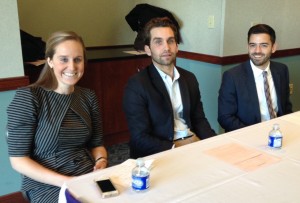
Ryan, who worked in real estate and project management before his successful election bid this past November, singled out the semester he spent in Rome among its age-old monuments – many of which still survive and function. His public service now includes infrastructure planning, and he draws on that time in Rome when thinking about lasting solutions. “Those of us who studied ancient Rome and Greece are better prepared to look at things from a longer perspective,” said Ryan. “We think not in quarters or years, but in decades, centuries, and millennia.”
Meg, who went on to earn an MBA at Dartmouth’s Tuck School of Business, highlighted how her Classics major has always distinguished her from others in her field. One distinguishing factor she emphasized was her ability to read things closely. “In my first internship I became known as the person who could read and edit documents with a critical eye,” she said. “Little details – little mistakes – matter, and that was something instilled in me during my Greek and Latin courses.”
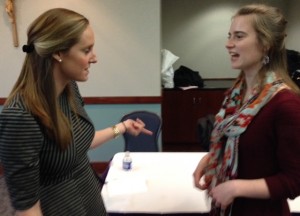
Colin, who has worked on television shows such as HBO’s “Boardwalk Empire” and films such as the upcoming Teenage Mutant Ninja Turtles 2, echoed Meg’s thoughts. “My Latin and Greek courses were a mental boot camp. The structure of sentences and of language is ingrained in the heads of Classics majors – whether we want it or not!” said Colin. “I’ve been able to use these ingrained reading and editing skills for reviewing production materials.”
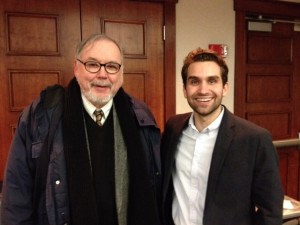
During the Q-and-A discussion with current students, Ryan brought up another habit of mind that unites Classics majors – and that has daily relevance for his work in government. “Classics majors are inquisitive people. We’re the types who get excited about the discovery of a lost scroll,” he said. “And this can spread to all aspects of our lives. We’re the ones asking more questions and deeper questions.”
In case you missed it: more HC Classics stories from 2015
Click on the hyperlinks for the following stories about Holy Cross Classics students, alums, and faculty:
*In March Jason Steranko ’17 presented his paper on war and peace in the Roman historian Sallust at an undergraduate colloquium at the Center for Hellenic Studies in Washington, D.C.
*In May Nik Churik ’15 was awarded a Fulbright to study Byzantine Greek texts at Leiden University in the Netherlands.
*In May Stephanie Lindeborg ’13 and Prof. Neel Smith spoke on the panel “Let’s Get Digital” at a meeting of the Classical Association of Canada in Toronto.
*In June Steve Stack ’94 began his term as the president of the American Medical Association, becoming the youngest AMA president since 1854.
*In June Ed Brzytwa ’99 was named the director of global policy for localization, trade, and multilateral affairs for the Information Technology Industry Council.
*In July Robert Dudley ’08, a Ph.D. candidate at Duke University, was awarded his second Fulbright, to study Cicero’s reception of Plato at Freie Universität in Berlin.
*Over the summer Brian Clark ’15, Claude Hanley ’18, Stephanie Neville ’17, Charlie Schufreider ’17, Alex Simrell ’16, and Melody Wauke ’17 unraveled the mystery of a Homeric scholion.
*In July the website Academic Minute interviewed Prof. Neel Smith on his work with digital texts.
*In September Nik Churik ’15 and Prof. Neel Smith spoke at a conference on the digital humanities in Grenoble, France.
*In November David Bonagura ’03, Classics instructor at Regis High School in New York, inquired about the poet Virgil and Catholicism. In December David discussed his work with Cardinal Dolan of New York.
*In December Tabitha Lord ’93 published her first science-fiction novel, Horizon.

